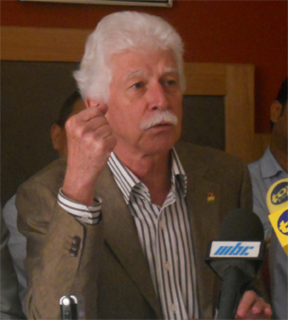 |
|---|
| This article is part of a series on the politics and government of Ethiopia |
|
Judiciary |
General elections were held in Ethiopia between 23 June and 7 July 1973, to elect all 250 members of the Chamber of Deputies, the lower house of the Ethiopian parliament (the upper house, the Senate, consisted of 125 senators appointed by the Emperor). [1] These were the last elections to be held under imperial rule in Ethiopia. [2] The elections were called after the parliament elected in 1969 was dissolved. [3] Prior to the dissolution of the old parliament, the Emperor Haile Sellassie I had put forward a proposal for land reform, including a new system of land taxation. [1]

Ethiopia, officially the Federal Democratic Republic of Ethiopia, is a country in the northeastern part of Africa, popularly known as the Horn of Africa. It shares borders with Eritrea to the north, Djibouti to the northeast, and Somalia to the east, Sudan and South Sudan to the west, and Kenya to the south. With over 102 million inhabitants, Ethiopia is the most populous landlocked country in the world and the second-most populous nation on the African continent that covers a total area of 1,100,000 square kilometres (420,000 sq mi). Its capital and largest city is Addis Ababa, which lies a few miles west of the East African Rift that splits the country into the Nubian Plate and the Somali Plate.

The Emperor of Ethiopia was the hereditary ruler of the Ethiopian Empire, until the abolition of the monarchy in 1975. The Emperor was the head of state and head of government, with ultimate executive, judicial and legislative power in that country. A National Geographic Magazine article called imperial Ethiopia "nominally a constitutional monarchy; in fact [it was] a benevolent autocracy".

The Ethiopian Empire, also known as Abyssinia, was a kingdom that spanned a geographical area in the current states of Eritrea and Ethiopia. It began with the establishment of the Solomonic dynasty from approximately 1270 and lasted until 1974, when the ruling Solomonic dynasty was overthrown in a coup d'état by the Derg.
Since no political parties were allowed per the 1955 constitution, only independent candidates contested the polls. All Ethiopian citizens aged 21 years and above were eligible to vote. In total the number of registered voters numbered around 7.3 million. [1] Some 4,234,000 registered voters took part in the polls. [4] The highest voter turnout (around 66%) was noted amongst the younger generation, aged 25 to 35. [5]
Emperor Haile Selassie proclaimed a revised constitution in November 1955 of the Empire of Ethiopia. This constitution was prompted, like its 1931 predecessor, by a concern with international opinion. Such opinion was particularly important at a time when some neighboring African states were rapidly advancing under European colonial tutelage and Ethiopia was pressing its claims internationally for the incorporation of Eritrea, where an elected parliament and more modern administration had existed since 1952.
Each electoral district, covering a population of around 200,000, was represented by two deputies. Towns with a population of above 30,000 had an additional deputy and then yet another deputy for every additional 50,000 inhabitants. [1]
1,500 candidates stood in the elections. Candidates had to the Ethiopians by birth, at least 25 years old and registered as residents in the constituency they contested. A candidate also needed to own real property worth E$ 1,000 and personal property of E$ 2,000. [1] 60% of the deputies elected were newcomers to the parliament, as many incumbent deputies either chose not to contest or had been defeated in the polls. [5] Overall, there was a trend of pro-land reform incumbents being defeated and anti-land reform candidates getting elected. [3]

The birr is the unit of currency in Ethiopia. Before 1976, dollar was the official English translation of birr. Today, it is officially birr in English as well.
The problem of land reform in Ethiopia has hampered that country's economic development throughout the late 19th and 20th centuries. Attempts to modernize land ownership by giving title either to the peasants who till the soil, or to large-scale farming programs, have been tried under imperial rulers like Emperor Haile Selassie, and under Marxist regimes like the Derg, with mixed results. The present Constitution of Ethiopia, which was put into force January 1995, vests land ownership exclusively "in the State and in the peoples of Ethiopia." The relevant section continues, "Land is a common property of the Nations, Nationalities and Peoples of Ethiopia and shall not be subject to sale or to other means of exchange." Despite these different approaches to land reform, Ethiopia still faces issues of sustainable food self-sufficiency.
After the elections, Endelkachew Makonnen became Prime Minister of the country. [1] The deputies were elected for a four-year term, which was interrupted by the overthrow of the imperial regime in 1974. [2]

Lij Endelkachew Makonnen was an Ethiopian politician. Born in Addis Ababa, his father, Ras Betwoded Makonnen Endelkachew, served as Prime Minister of Ethiopia in the 1950s. Endelkachew Makonnen was a member of the aristocratic Addisge clan that were very influential in the later part of the Ethiopian monarchy. He would be the last Imperial Prime Minister appointed by Emperor Haile Selassie. He was a stepson of Princess Yeshashework Yilma, Emperor Haile Selassie's only niece.

The Prime Minister of Ethiopia is the head of the Ethiopian government and the most powerful figure in Ethiopian politics. Although the President of Ethiopia is the country's head of state, her powers are largely ceremonial; the Constitution explicitly vests executive power in the Council of Ministers, and names the Prime Minister as chief executive. The official residence of the prime minister, is Menelik Palace in Addis Ababa. The current Prime Minister is Abiy Ahmed of EPRDF, the 15th person to hold the position.

The Derg, officially the Provisional Military Government of Socialist Ethiopia, was a military junta that ruled Ethiopia from 1974 to 1987. Known fully as the Coordinating Committee of the Armed Forces, Police and Territorial Army, the Derg was a committee of low-ranking officers and enlisted men in the Ethiopian Army, led by Chairman Aman Andom, that overthrew the government of the Ethiopian Empire and Emperor Haile Selassie I during mass protests in September 1974. Soon after it was established, the committee was formally renamed the Provisional Military Administrative Council but continued to be known popularly as "the Derg". The Derg formally abolished the monarchy and embraced communism as an ideology, establishing Ethiopia as a Marxist-Leninist one-party state with itself as the vanguard party in a provisional government. The abolition of feudalism, increased literacy, nationalization, and sweeping land reform including the resettlement and villagization from the Ethiopian Highlands became priorities. Mengistu Haile Mariam became Chairman in 1977, launching the Qey Shibir to eliminate political opponents, with tens of thousands imprisoned and executed without trial.





